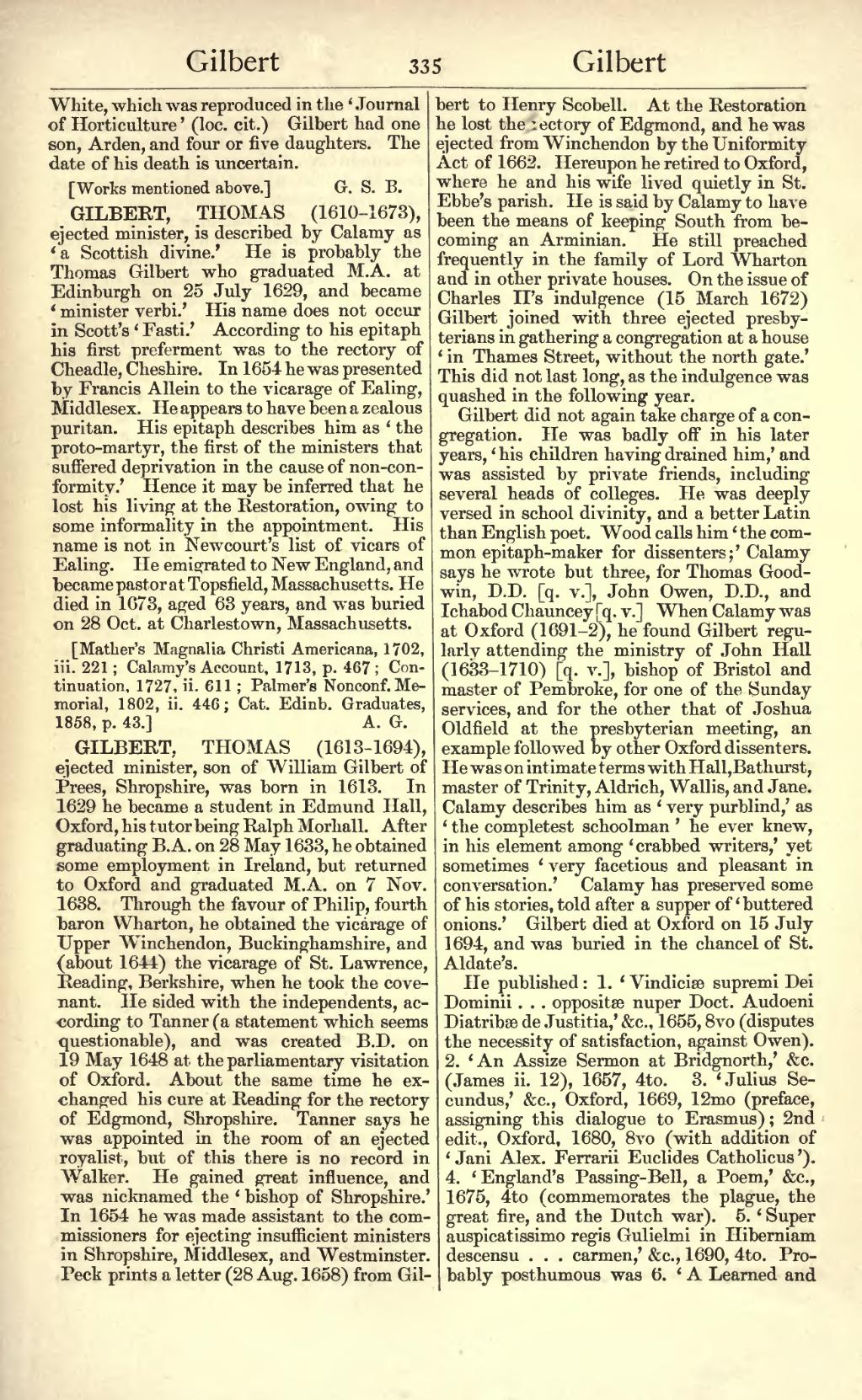White, which was reproduced in the ‘Journal of Horticulture’ (loc. cit.). Gilbert had one son, Arden, and four or five daughters. The date of his death is uncertain.
[Works mentioned above.]
GILBERT, THOMAS (1610–1673), ejected minister, is described by Calamy as ‘a Scottish divine.’ He is probably the Thomas Gilbert who graduated M.A. at Edinburgh on 25 July 1629, and became ‘minister verbi.’ His name does not occur in Scott's ‘Fasti.’ According to his epitaph his first preferment was to the rectory of Cheadle, Cheshire. In 1654 he was presented by Francis Allein to the vicarage of Ealing, Middlesex. He appears to have been a zealous puritan. His epitaph describes him as ‘the proto-martyr, the first of the ministers that suffered deprivation in the cause of non-conformity.’ Hence it may be inferred that he lost his living at the Restoration, owing to some informality in the appointment. His name is not in Newcourt's list of vicars of Ealing. He emigrated to New England, and became pastor at Topsfield, Massachusetts. He died in 1673, aged 63 years, and was buried on 28 Oct. at Charlestown, Massachusetts.
[Mather's Magnalia Christi Americana, 1702, iii. 221; Calamy's Account 1713, p. 467; Continuation, 1727 ii. 611; Palmer's Nonconf. Memorial, 1802, ii. 446; Cat. Edinb. Graduates, 1858, p. 43.]
GILBERT, THOMAS (1613–1694), ejected minister, son of William Gilbert of Prees, Shropshire, was born in 1613. In 1629 he became a student in Edmund Hall, Oxford, his tutor being Ralph Morhall. After graduating B.A. on 28 May 1633, he obtained some employment in Ireland, but returned to Oxford and graduated M.A. on 7 Nov. 1638. Through the favour of Philip, fourth baron Wharton, he obtained the vicarage of Upper Winchendon, Buckinghamshire, and (about 1644) the vicarage of St. Lawrence, Reading, Berkshire, when he took the covenant. He sided with the independents, according to Tanner (a statement which seems questionable), and was created B.D. on 19 May 1648 at the parliamentary visitation of Oxford. About the same time he exchanged his cure at Reading for the rectory of Edgmond, Shropshire. Tanner says he was appointed in the room of an ejected royalist, but of this there is no record in Walker. He gained great influence, and was nicknamed the ‘bishop of Shropshire.’ In 1654 he was made assistant to the commissioners for ejecting insufficient ministers in Shropshire, Middlesex, and Westminster. Peck prints a letter (28 Aug. 1658) from Gilbert to Henry Scobell. At the Restoration he lost the rectory of Edgmond, and he was ejected from Winchendon by the Uniformity Act of 1662. Hereupon he retired to Oxford, where he and his wife lived quietly in St. Ebbe's parish. He is said by Calamy to have been the means of keeping South from becoming an Arminian. He still preached frequently in the family of Lord Wharton and in other private houses. On the issue of Charles II's indulgence (15 March 1672) Gilbert joined with three ejected presbyterians in gathering a congregation at a house ‘in Thames Street, without the north gate.’ This did not last long, as the indulgence was quashed in the following year.
Gilbert did not again take charge of a congregation. He was badly off in his later years, ‘his children having drained him,’ and was assisted by private friends, including several heads of colleges. He was deeply versed in school divinity, and a better Latin than English poet. Wood calls him ‘the common epitaph-maker for dissenters;’ Calamy says he wrote but three, for Thomas Goodwin, D.D. [q. v.], John Owen, D.D., and Ichabod Chauncey [q. v.]. When Calamy was at Oxford (1691–2), he found Gilbert regularly attending the ministry of John Hall (1633–1710) [q. v.], bishop of Bristol and master of Pembroke, for one of the Sunday services, and for the other that of Joshua Oldfield at the presbyterian meeting, an example followed by other Oxford dissenters. He was on intimate terms with Hall, Bathurst, master of Trinity, Aldrich, Wallis, and Jane. Calamy describes him as ‘very purblind,’ as ‘the completest schoolman’ he ever knew, in his element among ‘crabbed writers,’ yet sometimes ‘very facetious and pleasant in conversation.’ Calamy has preserved some of his stories, told after a supper of ‘buttered onions.’ Gilbert died at Oxford on 15 July 1694, and was buried in the chancel of St. Aldate's.
He published: 1. ‘Vindiciæ supremi Dei Dominii … oppositæ nuper Doct. Audoeni Diatribæ de Justitia,’ &c., 1655, 8vo (disputes the necessity of satisfaction, against Owen). 2. ‘An Assize Sermon at Bridgnorth,’ &c. (James ii. 12), 1657, 4to. 3. ‘Julius Secundus,’ &c., Oxford, 1669, 12mo (preface, assigning this dialogue to Erasmus); 2nd edit., Oxford, 1680, 8vo (with addition of ‘Jani Alex. Ferrarii Euclides Catholicus’). 4. ‘England's Passing-Bell, a Poem,’ &c., 1675, 4to (commemorates the plague, the great fire, and the Dutch war). 5. ‘Super auspicatissimo regis Gulielmi in Hiberniam descensu … carmen,’ &c., 1690, 4to. Probably posthumous was 6. ‘A Learned and
